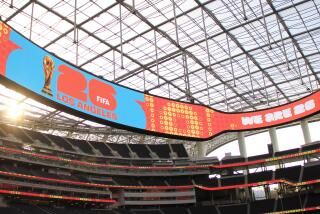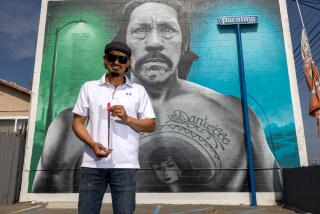Arts Beat
- Share via
- Three artists managed to cause an uproar when they placed a poster they created on the back of 100 San Diego Transit buses.
Granted, the poster, titled “Welcome to America’s Finest Tourist Plantation,” does not paint a positive picture of San Diego. The triptych of photographs, showing illegal aliens being arrested and at work, was designed to portray the role of low-paid, undocumented workers in the tourist industry.
A lot of tourist officials were worried about what tens of thousands of visitors, here for the Super Bowl on Jan. 31, might think of America’s bodacious beach city, should they see the posters.
Because the artwork was funded in part by the National Endowment for the Arts (NEA) and the City of San Diego through hotel and motel taxes, City Council members questioned whether such critical artworks ever should have received a public grant. Should artists bite the hand that feeds them, some asked. The artists--David Avalos, Elizabeth Sisco and Louis Hock--replied: Who is feeding whom? Isn’t government funded by the people through taxes?
COMBO, the Combined Arts and Educational Council, which administered the NEA-city award for the City of San Diego, was considered guilty by association.
“One important person in town” said she would not donate any more money to COMBO for endorsing this kind of art, COMBO executive director Jack Borchers said.
To set the record straight: COMBO, a private arts-funding agency, did not endorse the artwork; rather, COMBO administered the grants through a procedure that is standard practice across the country. The City Council appointed a special Community Advisory Council, which chose panels of arts professionals who selected the grantees from applications.
COMBO did, however, require grantees--upon pain of losing 10% of the grant--to acknowledge on all “printed material dealing with the grant’s project” that it was funded in part by the NEA and COMBO. And thus COMBO’s name was associated with the artwork, which it administered but did not endorse.
But the question of whether politicized public art should be funded with city money remains an issue, especially at a time when a powerful new city arts funding commission is being formed.
More to Read
Sign up for Essential California
The most important California stories and recommendations in your inbox every morning.
You may occasionally receive promotional content from the Los Angeles Times.













